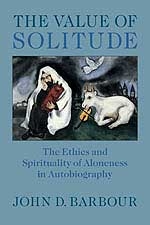
|
Posted January 16, 2005
Book: The Value of Solitude: The Ethics and Spirituality of Aloneness in Autobiography Author: John D. Barbour University of Virginia Press, Charlottsville, VA, pp. 237 An Excerpt from the Jacket:
An Excerpt from the Book: Thoreau shows that merely physical isolation is not enough to achieve the true purposes of solitude; a disciplining of consciousness and a receptiveness to new influences are also necessary. If solitude is to be more than an excuse for narcissism or solipsism, the mind must be turned to something beyond itself. Thoreau portrays himself as initially drawn into solitude by reaction against the negative features of his social context. Only with time, attentiveness, and self-discipline does he discern positive reasons for seeking to be alone. By the end of the book, Thoreau’s bitterness toward society has largely dissipated. As he reflected on the significance of his stay at Walden and made it the central event of his life, Thoreau tried to show that the most important outgrowth of his solitude was the transformation of his consciousness through attunement to nature. The spiritual journey he depicted was essentially a process of joyful self-renewal in harmony with the natural world’s cycles of growth. Appreciating the value of the natural world is closely linked to another value that Thoreau associates with solitude: wildness. He feels a strange and sudden desire to eat a woodchuck, “not that I was hungry then, except for that wildness which he represented.” Wildness should be respected both in the natural world and in humanity. He honors equally his yearnings for the good and for the wild: “I found myself, and still find, an instinct toward a higher, or, as it is named, spiritual life, as do most men, and another toward a primitive rank and savage one, and I reverence them both. I love the wild not less than the good.” Just as the individual needs to acknowledge the part of him that will not conform to “higher laws,” so society needs to respect the “wild men, who instinctively follow other fashions and trust other authorities than their townsmen, and by their goings and comings stitch towns together in parts where else they would be ripped.” Thoreau associates wildness not only with animals and sublime natural forces but also with those solitary persons who make their homes in the lonely places between villages. The wildness of these individuals is expressed in their independence, freedom, and solitude. The climatic chapter “Spring” culminates in a celebration of nature’s inexhaustible vitality, which we experience most powerfully in its capacity to exceed our efforts to control or even understand it. “Our village life would stagnate if it were not for the unexplored forests and meadows which surround it. We need the tonic of wildness — to wade sometimes in marshes where the bittern and the meadow-hen lurk, and hear the booming of the snipe; to smell the whispering sedge where only some wilder and more solitary fowl builds her nest, and the mink crawls with its belly close to the ground. At the same time that we are earnest to explore and learn all things, we require that all things be mysterious and unexplorable, that land and sea be infinitely wild, unsurveyed and unfathomed by us because unfathomable. We can never have enough of Nature . . .We need to witness our own limits transgressed, and some life pasturing freely where we never wander.” In this passage, appreciating nature’s wildness is an experience that mut be undergone alone. Contact with a wild and solitary fowl makes the human creature more wild and solitary. Life in community would stagnate without not only the surrounding natural environment, but also the wild individuals who live there, who by transgressing or ignoring society’s rules and regulations show the rest of us their proper place, their necessary but limited validity. For Thoreau, the wildness and spiritual vitality of both the natural world and human nature are closely associated with solitude. Table of Contents: 1. Christian solitude 2. Bounded solitude in Augustine’s Confessions 3. The Humanist Tradition: Petrarch, Montaigne, and Gibbon 4. Rousseau’s myth of solitude in Reveries of the Solitary Walker 5. Thoreau at Walden: “Soliloquizing and Talking to All the Universe at the Same Time” 6. Twentieth-century varieties of solitary experience 7. Thomas Merton and solitude: “The Door to Solitude Opens Only from the Inside” 8. Solitude, writing, and Fathers in Paul Auster’s The Invention of Solitude Conclusion: The Value of Solitude |
|
